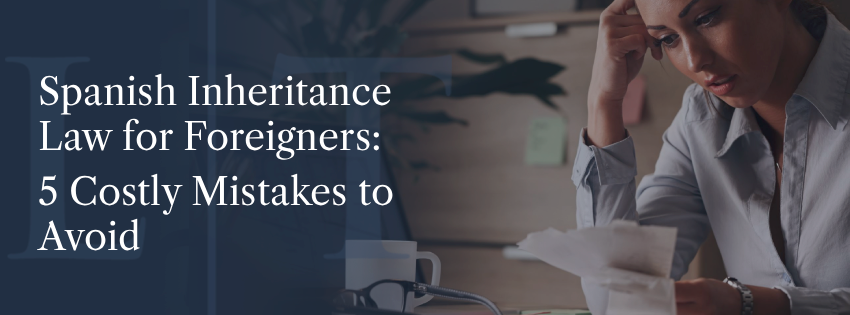The 5 Most Costly Mistakes Foreigners Make in Spanish Inheritance Law (And How to Avoid Them)
Navigating Spanish inheritance law can be one of the most complex challenges for foreigners who own assets or family property in Spain. With differences in civil law, regional tax rules, and strict deadlines, even small mistakes can lead to costly tax bills, legal disputes, and unnecessary stress.
At Lextax, we specialize in helping international families plan and manage inheritance matters in Spain. Below, we outline the five most common mistakes foreigners make—and how to avoid them.
1. Not Making a Spanish Will
The mistake: Many foreigners assume their home country’s will automatically covers Spanish property. In reality, this can cause delays, higher costs, and conflicts between jurisdictions.
The consequence: Spanish authorities may require complex legalizations, translations, and probate procedures, which can delay inheritance by months or even years.
The solution: Draft a Spanish will that coexists with your home country’s will. This ensures clarity, faster probate, and tax efficiency.
2. Ignoring Spain’s Regional Inheritance Tax Rules
The mistake: Assuming Spain has a single inheritance tax system. In fact, inheritance tax (Impuesto de Sucesiones y Donaciones) varies significantly between Spain’s autonomous regions.
The consequence: Heirs could pay thousands more in tax simply by applying national rules instead of the favorable regional rules.
The solution: Work with an advisor who knows both national and regional inheritance law, ensuring heirs apply the most beneficial regime.
3. Missing the Six-Month Deadline
The mistake: Many heirs are unaware that Spanish law requires inheritance tax to be declared within six months of death (extensions are possible, but must be requested on time).
The consequence: Late declarations result in interest charges and penalties, reducing the inheritance significantly.
The solution: Seek professional advice immediately upon death of the estate holder. At Lextax, we handle all filings within the legal deadlines, including extension requests.
4. Misunderstanding Forced Heirship Rules
The mistake: Foreigners often assume they can freely distribute their Spanish assets. However, Spain applies forced heirship (legítima), which reserves fixed shares for children and spouses.
The consequence: Wills that ignore these rules may be challenged in Spanish courts, leading to disputes and delays.
The solution: EU Regulation 650/2012 allows expats to choose their home country’s law to govern their estate. This choice must be clearly stated in the Spanish will.
5. Overlooking Lifetime Gifts and Planning Opportunities
The mistake: Focusing only on what happens at death, and ignoring opportunities to gift assets during one’s lifetime under favorable tax conditions.
The consequence: Missing out on tax exemptions or reductions available in certain regions, leading to a higher tax burden for heirs.
The solution: Strategic planning through lifetime gifts, company structures, or trusts can optimize tax exposure. Our advisors at Lextax provide tailored strategies for each family.
How Lextax Helps Foreign Families in Spain
- Spanish & International Wills: Drafting wills that align with both Spanish and foreign laws.
- Inheritance Tax Planning: Minimizing exposure through regional benefits and international treaties.
- Probate & Compliance: Handling filings, deadlines, and legal formalities.
- Cross-Border Advice: Coordinating with your home country to avoid double taxation.
- Dispute Resolution: Representing heirs in inheritance conflicts in Spain.
At Lextax, we act as your translator of complexity, making Spain’s inheritance law clear and manageable.
FAQs: Inheritance in Spain for Foreigners
Do I need a Spanish will if I already have one in my country?
Yes, it is highly recommended to have a Spanish will for assets in Spain to avoid delays and costs.
How much inheritance tax will my heirs pay in Spain?
It depends on the region, relationship to the deceased, and asset value. In some regions, tax is almost zero for close relatives.
Can I leave my Spanish property to whoever I want?
Not always. Spanish law applies forced heirship rules unless you clearly opt for your national law under EU regulations.
What happens if I miss the six-month deadline?
Penalties and interest apply. Extensions can be requested, but they must be filed on time.
Can Americans or non-EU citizens apply EU inheritance rules in Spain?
Yes. The regulation applies to anyone habitually resident in the EU, regardless of nationality.
Conclusion
Spanish inheritance law is complex and highly technical, particularly for foreigners with assets in Spain. The key to avoiding costly mistakes is proactive planning with expert legal and tax guidance.
At Lextax, we help families protect their assets, minimize taxes, and ensure a smooth inheritance process.
👉 Are you a foreigner with assets in Spain? Contact Lextax today to secure your family’s future with expert inheritance and tax planning.


